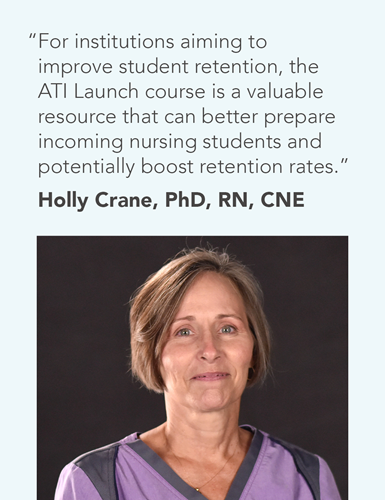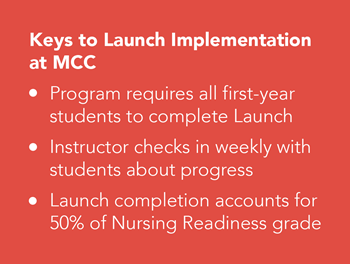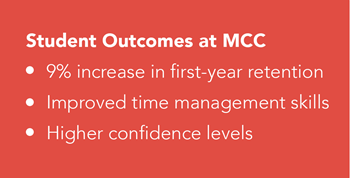From Struggle to Success: Keeping First-Year Nursing Students on Track
How One ADN Program Quickly Improved Student Retention
Like hundreds of programs across the country, the associate degree nursing program at Meridian Community College (MCC) in Meridian, Miss., recently faced a troubling trend in student retention. Incoming students were struggling with introductory courses, and first-year attrition rose to an alarming 35%.
MCC is certainly not alone. Retention is a shared challenge in nursing programs at all degree levels. Although definitive national data on student attrition rates has not been published in recent years, ATI partner institutions and faculty surveys consistently identify retention as a primary concern.
Some of the greatest struggles with student retention surface in the pivotal first year. As described in this recent article on the ATI Educator Blog, many nursing students are entering programs at a decided disadvantage, due to weaknesses in basic reading, math, science and English.1 These students require remediation in these areas, as well as instruction in study and test-taking skills.
MCC recognized these needs, identified a solution, and increased its first-year retention by nearly 10% in a single year. This article explains how the program got students on track quickly — without added burdens on faculty.
Taking Action to Prevent Nursing Student Attrition
MCC’s path to retention improvement began when Lara Collum, PhD, RN, the vice president for nursing and healthcare education, learned about Launch: Nursing Academic Readiness® and decided to implement it in 2024.
Launch is a 6-week program developed by ATI Nursing Education to help first-year nursing students solidify the academic, study and time management skills they need for the curriculum ahead of them.
Research published in 2025 shows that Launch leads to statistically significant improvement in first-year student performance and progress.2 This is achieved by pairing students with an ATI Educator who customizes their learning progress through the Launch curriculum.
 Holly Crane, PhD, RN, CNE, is an instructor who is the team leader for the MCC ADN program. She volunteered to serve as instructor for the Nursing Readiness course that requires students to complete Launch.
Holly Crane, PhD, RN, CNE, is an instructor who is the team leader for the MCC ADN program. She volunteered to serve as instructor for the Nursing Readiness course that requires students to complete Launch.
MCC implemented Launch specifically to reduce nursing student attrition, and the program began using it with incoming spring 2024 cohorts. Just 12 months later, the ADN program had increased first-year retention by 9%.
Key Features of Launch: Nursing Academic Readiness
ATI Nursing Education developed Launch to bridge the widespread student readiness gap that nursing programs face today. The 6-week program pairs each student with an ATI Educator who evaluates their weaknesses and guides their focused study through 6 modules:
- Pre-Assessment & Orientation
- Student Success Skills
- Nursing Math Basics
- Medical Terminology
- Anatomy & Physiology
- Program Assessment & Evaluation.
The pre-assessment, administered when each student begins Launch, identifies specific areas where students are weak and must focus their efforts. The post-assessment, administered after the ATI Educator determines that a student has completed all modules with satisfactory results, provides visibility into improvements. The post-assessment is a data-based indicator of whether a student is prepared to begin a nursing curriculum.
The ATI Educator communicates frequently with program instructors to ensure that they are aware of each student’s progress through the Launch modules, including whether they are completing assignments on time. On the ATI faculty dashboard, educators have visibility into each student’s activity throughout the time they are participating in Launch.
Setting the Structure for Success
 One of the most important decisions a program makes when implementing Launch: Nursing Academic Readiness is about the placement and timing. Some schools provide it prior to the start of the first course in a program and require or strongly recommend it as prework and preparation for success. Other schools embed it in the first course of the introductory portion of the curriculum or select another placement.
One of the most important decisions a program makes when implementing Launch: Nursing Academic Readiness is about the placement and timing. Some schools provide it prior to the start of the first course in a program and require or strongly recommend it as prework and preparation for success. Other schools embed it in the first course of the introductory portion of the curriculum or select another placement.
At MCC, the faculty decided to embed Launch in the introductory nursing course, Nursing Readiness, and to encourage incoming students to begin working in Launch before the first official class session. Each student admitted to the MCC ADN program, whether in a traditional or hybrid cohort, is required to complete Launch.
Dr. Crane said MCC students complete the majority of Launch coursework before the semester begins. Half of the Nursing Readiness pass/fail course grade is based on completing Launch, while the other half is derived from quizzes covering OSHA guidelines, library resources, course expectations, and the student handbook.
“As the instructor for this course, I email each student weekly progress reports,” Dr. Crane said. “This helps keep them accountable, and it reinforces time management skills — an essential component of nursing education.”
The opportunity to earn an "A" in the Nursing Readiness course also serves as motivation to complete Launch, she said.
Dr. Crane said the structure of Launch also encourages accountability, and that its ability to track student progress provides valuable insights into their study habits.
“Students who stay on track with their Launch coursework tend to maintain the same level of consistency in their first-semester nursing course. Conversely, those who procrastinate in Launch often struggle with deadlines and adjusting to the demands of the nursing curriculum,” she said.
Outcomes of Launch: Nursing Academic Readiness
Prior to implementing Launch, MCC worked to improve first-year retention by implementing faculty coaching for students with a unit test average between 75 and 79.5 (the minimum passing score for the program is 80).
Each participating student was paired with a faculty mentor for weekly coaching on reading strategies, time management, study skills, and test-taking techniques. But because participation was optional, students who chose not to participate were often unsuccessful, Dr. Crane said. Now, MCC pairs faculty coaching with Launch. And the results are encouraging to both faculty and students.
 During MCC’s first 12 months of requiring Launch, 6 cohorts (247 total students) improved their academic readiness through a combination of the Launch curriculum and MCC faculty guidance. This proactive approach is giving students the opportunity to address gaps in knowledge and skills, setting them up for success, Dr. Crane said.
During MCC’s first 12 months of requiring Launch, 6 cohorts (247 total students) improved their academic readiness through a combination of the Launch curriculum and MCC faculty guidance. This proactive approach is giving students the opportunity to address gaps in knowledge and skills, setting them up for success, Dr. Crane said.
Better time management is an especially valuable outcome Dr. Crane has observed among students who have completed the Launch program.
“The 6-week course helps students develop discipline while balancing work, family responsibilities, and academics,” she explained. “This is an essential skill for nursing school success. For our student population, time management is one of the biggest barriers to academic achievement.”
In addition, “Launch fosters critical skill development that is necessary for success in nursing school,” Dr. Crane said.
This essential skill development is borne out by the significant increase in first-year retention since MCC implemented Launch.
“Our retention rates in the first-semester course increased from 65% in spring 2023 to 74% in spring 2024,” Dr. Crane said. “While other factors may have also contributed to this improvement, Launch has played a significant role.”
Students Recognize the Value of Improved Academic Readiness
The MCC students who have completed Launch report that they value the program, especially the anatomy and physiology review and the study skills module. As part of the Nursing Readiness course, students complete a survey about their experience with Launch. Dr. Crane said 100% of students have completed the survey during the time MCC has used this ATI program.
Comments from the surveys include:
- “I feel like it prepared me for future courses.”
- “I liked the testing strategies and study techniques.”
- “Learning different subjects beforehand helped me prepare for the course content.”
- "I found it helpful and a good review before beginning the nursing curriculum.”
- “I had a good experience with my ATI instructor, and I was able to work at my own pace.”
- “The work wasn't overwhelming. I was able to fit it into my schedule and even get it done well before the required date.”
Based on MCC’s outcomes with Launch, Dr. Crane said she considers the program a strong foundation for success in nursing school.
“It reinforces critical concepts students will rely on throughout their nursing education, while also integrating effective study strategies and promoting mental wellness,” she said. “For institutions aiming to improve student retention, the ATI Launch course is a valuable resource that can better prepare incoming nursing students and potentially boost retention rates.”
The retention improvements at MCC are one of hundreds documented since Launch: Nursing Academic Readiness was introduced in 2023. At the Lansdale School of the Business PN program, for example, faculty credit Launch with “immediate” changes in student performance.3
“Launch has helped us tremendously,” said Lori Spiezio, MSN, RN, WCC, director of nursing for the PN program. “Students have a more solid foundation to help them succeed in their other courses.”
References
1. Course Correction: How Early Action and Support Improve First-Year Retention in Nursing Students. ATI Educator Blog.
2. Phillips BC, Hodge K. (2025). Enhancing student retention in nursing education: strategies and interventions. Teaching and Learning in Nursing. https://doi.org/10.1016/j.teln.2025.02.018
3. Setting First-Year Students Up for Success — From Start to Finish. ATI Educator Blog.


